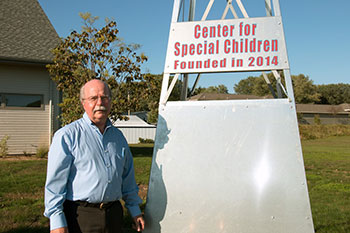Alumnus James DeLine, MD, Helps Amish with Rare Genetic Condition

James DeLine, MD, founded the Center for Special Children in La Farge to attend to the particular health needs of Amish and Old Order Mennonite families in Wisconsin.
James DeLine, MD, (Wausau ’83) has practiced family medicine in La Farge since 1983. In 2015 he started the Center for Special Children to care for Wisconsin’s large concentration of Amish and Old Order Mennonite people.
Rural doctors pride themselves on being able to treat a wide range of conditions in their patients, but Dr. DeLine’s practice brings him face to face with several rare genetic conditions that were present when the Amish and Mennonites immigrated from Europe to America and then Wisconsin. And that, in turn, has brought Dr. DeLine into a close collaboration with specialists at the University of Wisconsin–Madison who have developed tests, and suggested treatments, for some of those conditions, including siterosterolemia.
Unraveling a Mystery
In the fall of 2018, Dr. DeLine sat down to speak with the parents from an Amish family he’s come to know well in Wisconsin’s Driftless Region. Six of their 11 children live with siterosterolemia, an extremely rare disease that can cause joint damage, stroke or heart attack, due to accumulations of a plant-based fat akin to cholesterol. Dr. DeLine and the parents recounted how they learned that the family carried a gene for the rare disease. Years previously one of their sons had been seen at the La Farge clinic with painful arthritis and large lumps in his limbs. “Later, when we discovered that a relative of his mother had sitosterolemia,” DeLine explained, “we thought back to this young man and with some searching, we found him, had gene testing done at UW–Madison, and discovered that he too had the disease.” After starting medicine and changing his diet, the patient’s elbow lumps began melting away, DeLine said. “He has had no further arthritis, and his exercise tolerance has improved.” Eventually, with genetic testing at UW–Madison, the mutation was diagnosed in six of the 11 children.
In the tradition of family doctoring, Dr. DeLine has become an expert in the culture, family relationships, and medical needs of the Amish and Old Order Mennonites (sometimes called the “Plain” people). Although their acceptance of technology is highly constricted by culture and religion, the Plain benefit from Dr. DeLine’s hybrid of 19th century rural doctoring with 21st century genetic medicine.
The genetic work has relied on clinicians from the School of Medicine and Public Health, and on testing at the State Laboratory of Hygiene. The State Lab has already developed fast, low-cost diagnostic tests for more than 30 conditions afflicting Plain populations in Wisconsin. Funding for these tests and related activities came from grants totaling $800,000 from the Wisconsin Partnership Program in the School of Medicine and Public Health. “This team’s innovative and successful community-engaged research has resulted in increased newborn screenings and affordable genetic testing that have the potential to spare our state’s Plain families from fatal medical conditions and costly hospitalizations,” said Richard Moss, PhD, senior associate dean for basic research, biotechnology and graduate studies at UW-Madison.
Genetic diseases among the Plain arise from “founder mutations” that were present in the few Amish and Old Order Mennonites who immigrated to America in the 19th century. A second “genetic bottleneck” occurred among smaller groups that moved to Wisconsin, starting about a century ago. Most of the genetic diseases he sees can be treated if not cured, Dr. DeLine said.
Mixing Old and New
Dr. DeLine’s long and deep experience with many Amish families, and his anthropological knowledge of family relationships are part of his doctor’s toolkit. So are home visits.
“He talks about how helpful it is to see a child in the home environment, surrounded by siblings, grandparents, parents,” said Christine Seroogy, a professor of pediatrics. Seroogy is one of several UW–Madison colleagues who provide outreach clinical services with the Center for Special Children. “It’s been quite an experience, an honor, to take part in those home visits.”
When Dr. Seroogy began working with Dr. DeLine in 2007, one focus was severe combined immune deficiency (SCID, or “bubble boy”) disease. Though fatal, SCID can be detected with newborn screening and in some cases treated with bone marrow transplant. Over the years, she has worked closely with Dr. DeLine, newborn screening experts at the State Laboratory of Hygiene, and Plain families to improve SCID diagnosis and treatment.
In many cases, a true diagnosis can keep patients out of hospitals and away from physicians who tend to order an endless series of costly tests that cause more trouble than healing. “When we must deliver news about a child with a lethal disorder,” Dr. DeLine said, “if the family knows what’s going on, sad though it is, it’s a gift to the family to take the child home and care for them surrounded by their community and their family. It’s hard to treat something you don’t recognize, understand,” Dr. DeLine added. “Each time a new condition is identified, the search for a cure can begin.”
Published: January 2020
